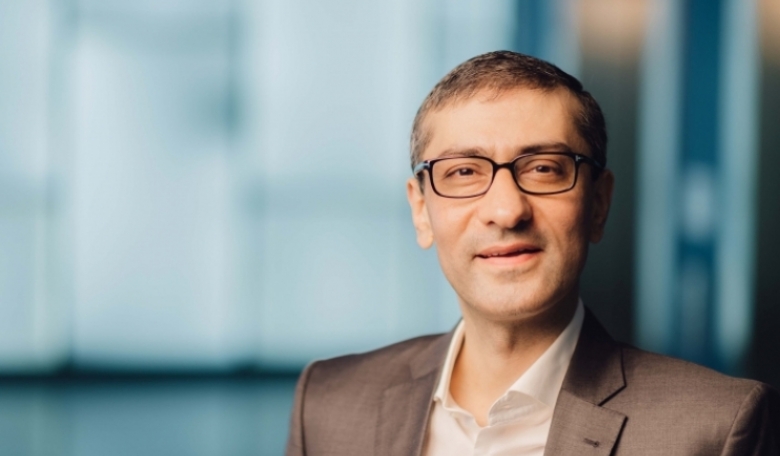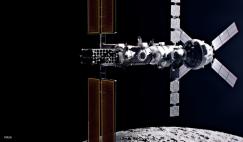Counselling against complacency, Raveej Suri, Inmarsat’s Chief Executive Officer, said: “So far we have been lucky that we haven’t seen any major collisions in space, but we would be foolish to rely on luck alone.”
His wake up call to governments and industry was delivered during a no-holes-barred keynote speech to more than 100 delegates at the New Space Atlantic Summit, organised by the Portugal Space Agency (PSA) in Lisbon this week.
“It would be irresponsible of me not to call out that I believe we are at a crisis point regarding space sustainability which requires immediate and decisive action,” he stated. “Every year that we fail to act increases the cost of future actions and makes it more technically difficult to deliver an effective cleanup strategy.”
At Inmarsat we do not take the operating environment for granted but I am concerned that the world is now entering a system wide emergency, with low Earth orbits (LEO) particularly vulnerable, and we no longer have the luxury of patient action.
Suri, who transferred from Nokia to head up the London-based satellite services provider in 2021, welcomed moves in the past year which have seen more countries signing up to the ASAT (anti-satellite testing) ban, ESA proposing a zero space debris policy by 2030, a new five-year rule for satellite disposal after reaching the end of their operational life, and space sustainability policy initiatives from the UK.
But he said even these initiatives were “insufficient” compared to the gravity of the problem, citing examples of increasing space debris proliferation and the rising number of orbital near misses - including one by two defunct satellites earlier this year that came within 10 m of each other.
Suri also highlighted the work of Prof Hugh Lewis at the University of Southampton who recently released data that showed in March alone SpaceX Starlink satellites performed more collision avoidance manoeuvres in a single month than in the entire first 2.5 years of Starlink deployment.
Based on statistical models produced by the ESA space debris office, it is estimated that there are 36,500 objects larger than 10 cm, one million objects between one to 10 cm and an extraordinary 130 million objects between 1 mm and 1 cm.
These tiny objects could be anything from paint flecks from rockets to small fragments created from in-orbit impact, but travelling faster than a bullet they can still cause an incredible amount of damage to something else in orbit.
“These numbers and the risk to incumbent services will only increase as tens of thousands of satellites are launched into orbit over the coming years, many as part of so called mega constellations in low Earth orbit,” he said.
“So far we have been lucky but we would be foolish to rely on luck to keep to space commons - areas and resources that fall outside national jurisdiction - open for sustainable use. We urgently need to align to a shared understanding of the problem and agree on principals of action.”
Suri proposed a series of guiding tenets - understanding the constraints of the operating environment, bringing scientific consensus to orbital capacity, and providing equitable and fair solutions to benefit all - to help address the problem.
He also suggested that equity considerations should reach beyond the boundaries of space into Earth’s atmosphere where space environmentalism is already asking questions about the effect of industrialising the de-orbiting of spacecraft and what that does to the precipitous chemical balance of the upper atmosphere.
“We need to make gains in each area, we need to acknowledge that space is finite and move to an urgent scientific consensus on orbital capacity parameters,” he said. “We need to create the means to deal with space debris and we need to keep equity considerations front of mind.”
Whilst acknowledging that UN and ITU (International Telecommunication Union) processes are important, he declared it was time for a “like-minded group of countries” to commit collectively to shared principles, to share regulations and coordinating mechanisms for safe space operations and orbital development.
“This could be achieved by countries such as the UK, US and those in the EU coming together to agree a baseline understanding of the issues and set out basic standards,” he argued. “The collective influence of such a grouping would create a powerful precedent for new entrants to space and those that wish to do business with us.”
He said one of the most effective measures would be to make market access reliant on sustainable and responsible behaviour. “Of course, withholding rights should not be done lightly and it is not a substitute for a global regime which could give full meaning to equity considerations.
“As the CEO of a satellite communications company, space sustainability is an existential issue for my industry. Taking immediate action is not only the right thing to do, it is the smart thing to protect considerable global investment in R&D and infrastructure to ensure that we will continue to operate and provide valuable services well into the future.
“Likewise the stakes for governments are extremely high. The global economy is dependent on satellite-enabled applications, now taken for granted as part of our daily lives whether for safe transit, banking or complex logistics.
“I submit to you that 2023 is a make or break year for our future as a space faring community. Governments and leaders need to take urgent action and demand that operators maintain an open, predictable and sustainable space commons. The stakes have never been higher and the time to act is now.”
Keynotes and panel discussions at the Summit, held at the premises of the European Maritime Safety Agency (EMSA) and the sixth in series of events focused on the theme of ‘A Global Effort for Space Sustainability’.
Speakers included Peter Martinez, Executive Director of the Secure World Foundation, who drew parallels with the development of the environmental movement and said space sustainability needed a similar multi-faceted approach.
International Institute of Space Law (ISSL) President Kae-Uwe Schrogl referred to “out-dated and unenforceable laws” governing outer space. “Sustainability can only be reached on a level playing field and at present we don’t have an architecture for space law. Flags of convenience cannot be allowed,” he stated.
Daniel Smith, CEO of Edinburgh-based AstroAgency, a strategic space marketing and media firm, brought an industry perspective to delegates and urged them to "grasp the opportunity" while there was still time.
“The last thing we really need are more strategies without action,” he said. “The NewSpace economy can be shaped by new space players if we act in unity now.”
Portugal Space Agency president Ricardo Conde described sustainability as “underpinning the country’s expanding efforts in space” and said the agency was targeting “pragmatic solutions” that would help the country tackle today’s most pressing problems, including the impacts of climate change.
“Today, two of the big long-term motivations for space exploration are mining and the extension of territory. Portugal is not interested in mining other worlds and we don't have a vision for the geopolitical extension of territory. We will use our tools and expertise to make space work in a sustainable way."











